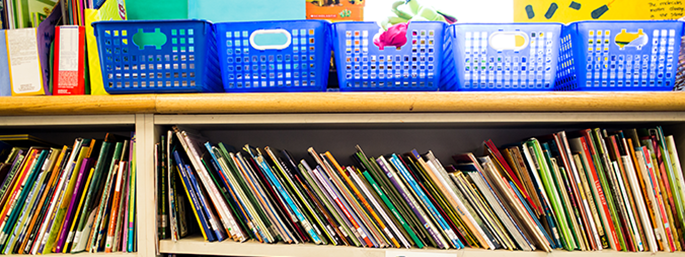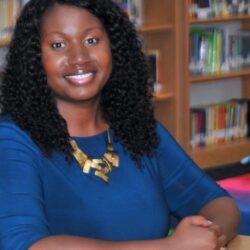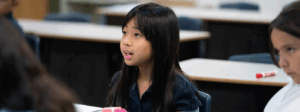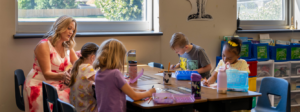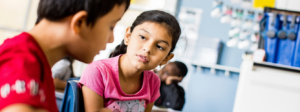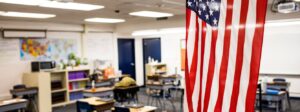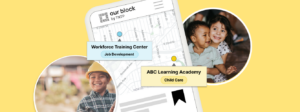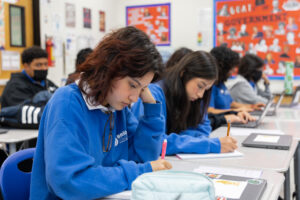DeKalb County, Georgia, has played a big part in my life. I graduated from Southwest DeKalb High School in DeKalb County School District (DCSD) before going on to attend Spelman College as an undergraduate and Georgia State University for graduate school. The DeKalb County community has a place in my family’s story of emerging from generational poverty. Today, it’s where I’ve personally put down roots as a homeowner and where I’m professionally engaged with the teams I lead at TNTP, which are focused on ensuring schools in DCSD provide the same opportunities for all students that they gave me.
One of my projects, the ATL Leadership Network, has been building leadership capacity to sustain transformation in Atlanta Public Schools and DCSD since 2018. We work with school leadership teams, teachers, and community members in these districts to harness their collective power to lead and transform their schools. In DCSD, we’ve worked closely with Superintendent Cheryl Watson-Harris and her teams since she assumed her role last July, to ensure the work of the ATL Leadership Network is positioned to both reinforce and accelerate the priorities outlined in DCSD’s Strategic Plan. I recently had the opportunity to interview Superintendent Watson-Harris about the district’s efforts to empower its young scholars to inspire, achieve, and excel. We started with a topic that, in many ways, shaped her first year as superintendent: COVID-19.
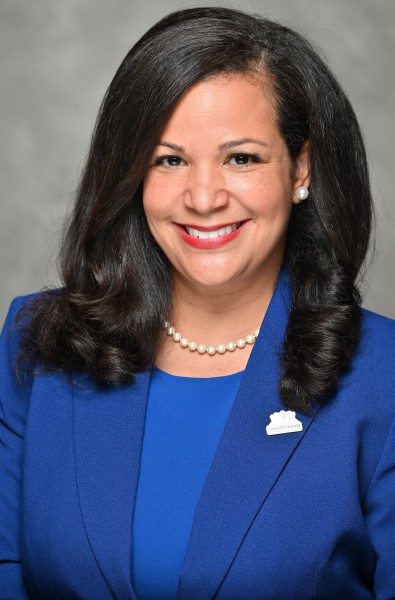
DeKalb County School District Superintendent Cheryl Watson-Harris
What lessons have you learned in your 25+ years in education that have helped you tackle the challenges of the past year?
Something I learned as a first-year teacher nearly 27 years ago was to keep the main thing, the main thing—for me, that’s the children and always making sure that whatever we’re doing is student centered and in service of what’s best for the scholars. This was particularly important during the pandemic. Our priority was to ensure that our students were safe and healthy—that while they weren’t physically in school, we knew where they were and that their food insecurities were addressed. Equally important was ensuring that our students were learning and having a joyful experience. Even in a virtual environment, it was important for our kindergarteners to dance, sing, and get the wiggles out and for our older scholars to have those important opportunities to create memories.
Keeping the main thing, the main thing my team and our school teams continue to focus on both high expectations for grade-level learning and creating engaging and challenging experiences for our scholars. We had to work together. We could not achieve any of this alone.
Why is community collaboration so critical for DCSD?
There’s a well-known Zulu phrase, “Umuntu ngumuntu ngabantu,” which translates to “I am because you are.” It’s an African philosophy about the importance of our interconnectedness and collective responsibility for success. It’s something I’ve subscribed to since I began my teaching career in Bedford-Stuyvesant in Brooklyn, New York. Let me preface this by saying that I share this story, not to perpetuate any negative stereotypes of the community but to convey what was happening at the time. My first years in the classroom coincided with the height of the crack epidemic. Many of my students had been born substance addicted, and most had never been out of their neighborhood. I immediately realized that I could do my very best and still not truly change the trajectory of their lives. For them to achieve their preferred future—not the future they see every day but the one that represents their most audacious dreams—would require a true community approach.
In DCSD, we have so many things to be proud of, and we have many issues that we’re grappling with, which, at their root, are often the result of long-time inequities and the marginalization of entire communities and groups of students. Making progress requires a team approach—all of us bringing our expertise. I have a set of expertise, you have a set of expertise, and our community partners also have a set of expertise. We must all come together around the table to create a shared vision for DCSD scholars and then each do our part to make that vision a reality.
One of the things I really love about DeKalb County is the amazing partners. There are so many people and organizations that want to be a part of the solution. My job is to ensure that DCSD has the infrastructure in place to be a good partner, which is why I created the new division of Community Empowerment, Innovation, and Partnerships. As a district, we’re committed to ensuring that the services, supports, and resources our partners bring to the table get to our students.
What do you hope to achieve with your efforts to empower DCSD families?
A misstep school systems often make when working with families who live below the poverty line, who are raising English language learners, who have students with special needs, or who moved to this country as refugees is that they approach these families by trying to save them instead of serve them. Too often, education systems undervalue these families. I see it as our job to meet parents where they are, respect their role as their child’s first teacher, and provide the tools they need to best support their scholars.
Authentic community empowerment and engagement mean that we honestly believe we can learn something from our parents and our partners, who often know the community better than we do. They have unique insights into each community we serve, and they can help us target our supports. It requires humility on our part to acknowledge that many people and organizations have a part to play in making sure our scholars are successful.
What do you see as the role of high expectations in helping DCSD take academic achievement to the next level and empower young scholars to inspire, achieve, and excel?
There are far too many people who believe that just because you’re poor, Black, a refugee, or an English language learner that you’re not going to be successful. I don’t tolerate that. Our scholars are beautiful and brilliant. There’s an innate genius in all of them. It’s our responsibility as adults to pull that out—to help them be and see their greatness.
For our scholars to become resilient, relentless, and self-advocates, we must have high expectations for each of them. That means setting a rigorous program and providing access to the grade-level standard. It also means remediating as we’re accelerating. When we provide scaffolds for students who are behind, we still hold them to high standards.
I’ve been described as a champion for children, and I’m unapologetic about it. I want people to know that if I’m on the scene, it’s going to be about the children, and I’ll create spaces for them to have a voice. Too often, students are left out of conversations that affect them. I believe strongly that you do not do things to people; you do things with them, and that extends to our students. A student on our advisory council said it best: “This is what empowering students really looks like—not just saying we have a seat at the table but actually giving us one.”
Our students aren’t afraid to tell us exactly what they want, and when they do, part of my approach to holding high expectations for our scholars is helping them gain the skills to advocate for themselves. While it’s important that we believe in our scholars, it’s even more important that they believe in themselves.
What’s your vision for a DCSD graduate?
Shanequa, you’re a perfect example of our vision for a DCSD graduate. The vision is that our children will graduate and not just go to college but excel once they get there. We want them to not just be career ready but be ready to be hired into a family-sustaining career or to establish themselves in the military. Getting there will be different for every scholar. Some may have more roadblocks than others. It’s our job as a community to work together to remove as many of those barriers as possible so that every child reaches their goals.
